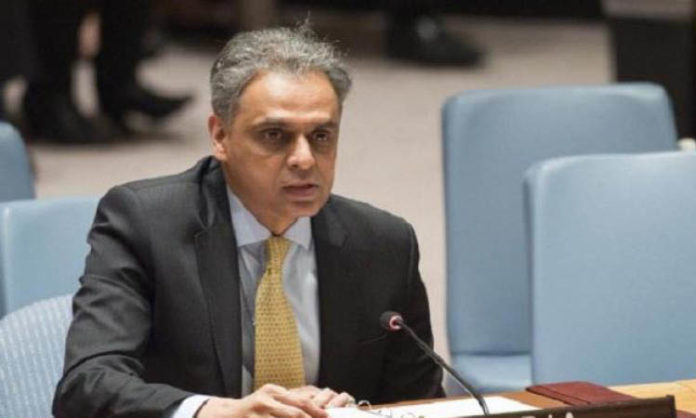With Pakistan expected to rake up the Kashmir issue during the high-level UN General Assembly session this week, India said a “one-trick pony” could “regurgitate” the same act but “single act plays” had no resonance on multi-lateral platforms like the United Nations.
India’s Permanent Representative to the UN Ambassador Syed Akbaruddin said the UN General Assembly session is a global platform to address global issues, yet each country is sovereign and could do what they feel is in their best interests.
“If somebody else would like to be a one-trick pony, it is for them to regurgitate and act. We have handled this act many times in the past and are confident that we will do so again,” Akbaruddin told reporters here on Sunday.
He was responding to a question on Pakistan expected to rake up the Kashmir issue “at a higher decibel” during the high-level session of the 73rd UN General Assembly beginning at the world body’s headquarters on Monday.
“Our contention is that the UN works best on multilateralism and multi-lateral platforms work best when nations work in partnerships.
“Single-act plays have no resonance in such matters. Anybody can try and be a solo player. However, solo players in a multi-lateral context have neither the past nor a future,” he said, adding that it is a country’s call on how they spent the time allocated to them during the UNGA session.
India works in partnerships, Akbaruddin said, adding that India is proud that its priorities during the General Assembly had great resonance in the international community.
Pakistan has consistently used the platform of the UN General Assembly to rake up the Kashmir issue and its leaders have sought to internationalise it during their addresses in the General Debate. India responds strongly to Pakistan, whose attempts to raise the Kashmir issue every year at the multi-lateral forum have found no resonance with the international community.
Following India’s acceptance of Pakistan Prime Minister Imran Khan’s request for a meeting, External Affairs Minister Sushma Swaraj and her Pakistani counterpart Shah Mahmood Qureshi were slated to meet on the sidelines of the General Assembly.
However, India called off the meeting, citing the brutal killings of three policemen in Jammu and Kashmir and Islamabad releasing postage stamps “glorifying” Kashmiri militant Burhan Wani.
Khan had tweeted that he is disappointed at the “arrogant and negative” response by India to his call for resumption of the peace dialogue.
When asked about Khan’s response, Akbaruddin said India is a multi-literalist nation and responds to multi-lateral issues of a global nature that it is confronted with. “What you have raised is an issue relating to our bilateral ties. Those will be addressed bilaterally in the format that we desire to address them.”
On whether India would raise strongly the issue of cross-border terrorism during the UNGA session, Joint Secretary for UN Political in the Ministry of External Affairs Dinesh Patnaik said the issue of cross-border terrorism had been raised by the country since 1996 when it put in the idea of the Comprehensive Convention on Terrorism. Akbaruddin said the scourge had been and is a concern for India.
“It’s a global concern. Terrorism is threatening countries across vast spades of land in diverse continents,” he said, adding that terror outfits such as Boko Haram and Islamic State are a threat to several countries across Africa and West Asia.
“Even in our neighbourhood, terrorism has increased as a major threat. This has been our perennial concern and obviously perennial concerns will be articulated in unison with many other countries who are raising this,” he said.
Pakistan’s foreign minister Shah Mahmood Qureshi is expected to highlight the situation in Kashmir during his General Assembly address, Pakistani media reported on Monday.
Qureshi arrived in New York over the weekend and is scheduled to address the annual world body session on September 29. PTI




































